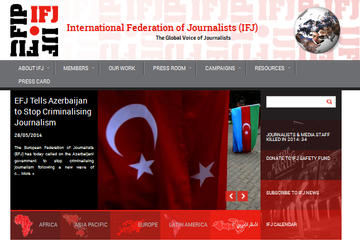
Job insecurity and inadequate protection are among the problems that journalists in the seven countries created from the breakup of the former Yugoslavia face today, a report published by the International Federation of Journalists (IFJ) on May 22nd suggests
Reporters working in those countries can be divided into two groups, IFJ Vice-President Jasmina Popovic said in her contribution to the report, Balkans and Former Soviet Union Press Freedom Review – January 2011-December 2013.
"The first group, from Slovenia and Croatia, comprises journalists who managed to achieve certain rights for a period, only to see them lost to the global crisis that has afflicted the media," she wrote. Then, in Bosnia and Herzegovina, Kosovo, Macedonia, Montenegro and Serbia "there are the journalists who, in the 23 years since the disintegration of Yugoslavia, have never enjoyed the full rights of journalists and cannot even know what they could have lost," Popovic added.
The 69-page review includes also country reports, outlining journalist unions' activities in Croatia, Macedonia, Montenegro and Serbia. With minor variations, each one of them paints a rather gloomy picture of the media situation in the respective nation.
The Croatia report says "freedom of the media has faded" in the country, with "insecure, intimidated, frightened and poorly paid journalists pushed into precarious jobs and uncertain existence," so that they "have ceased to be credible guarantors of media diversity and freedom".
Controversial media bills, imprisoned journalists, the government's dominance on the advertising market, intransparent ownership structures and polarization of media along political and business lines are seen as having contributed to the deterioration in the media situation in Macedonia in recent years. "Media independence and freedom of speech is being marginalised," according to the Balkan country's two main media organisations, the Association of Journalists of Macedonia and the Independent Union of Journalists and Media Workers in Macedonia.
The report on Montenegro also notes the decline in media freedom in the country. Journalism has become dangerous there as the perpetrators of attacks against media professionals remain largely unpunished.
"The few who are prosecuted usually play only marginal roles in the attacks and escape with minimum sentences," the Montenegrin Media Trade Union said. "Those who issue the orders are never identified. Public officials responsible for verbal or physical attacks are never prosecuted."
The Journalists' Union of Serbia viewed the situation in the country's media sector as "extremely tough". This was the outcome of "a disastrous privatization process," in which the media went into the hands of local tycoons and politicians, who then dismissed all professionals, closed down the news rooms and used the buildings for other purposes. News reporters in those media are paid just 150 euros per month, they have no "written contracts, no union protection and little freedom".
In addition, the study includes country reports on seven former Soviet republics, as well as an overview of the situation in Turkey, provided by the Turkish Journalists Syndicate, which focuses on developments in the area of press freedom in Turkey after Gezi 2013.
Questa pubblicazione è stata prodotta con il contributo dell'Unione Europea. La responsabilità sui contenuti di questa pubblicazione è di Osservatorio Balcani e Caucaso e non riflette in alcun modo l'opinione dell'Unione Europea. Vai alla pagina del progetto Safety Net for European Journalists. A Transnational Support Network for Media Freedom in Italy and South-east Europe.
Log in or create a user account to comment.

 Report paints gloomy picture of media situation in Balkans
Report paints gloomy picture of media situation in Balkans 




 Tutti i contenuti disponibili sul sito di Osservatorio Balcani e Caucaso sono distribuiti con licenza
Tutti i contenuti disponibili sul sito di Osservatorio Balcani e Caucaso sono distribuiti con licenza  To Top
To Top